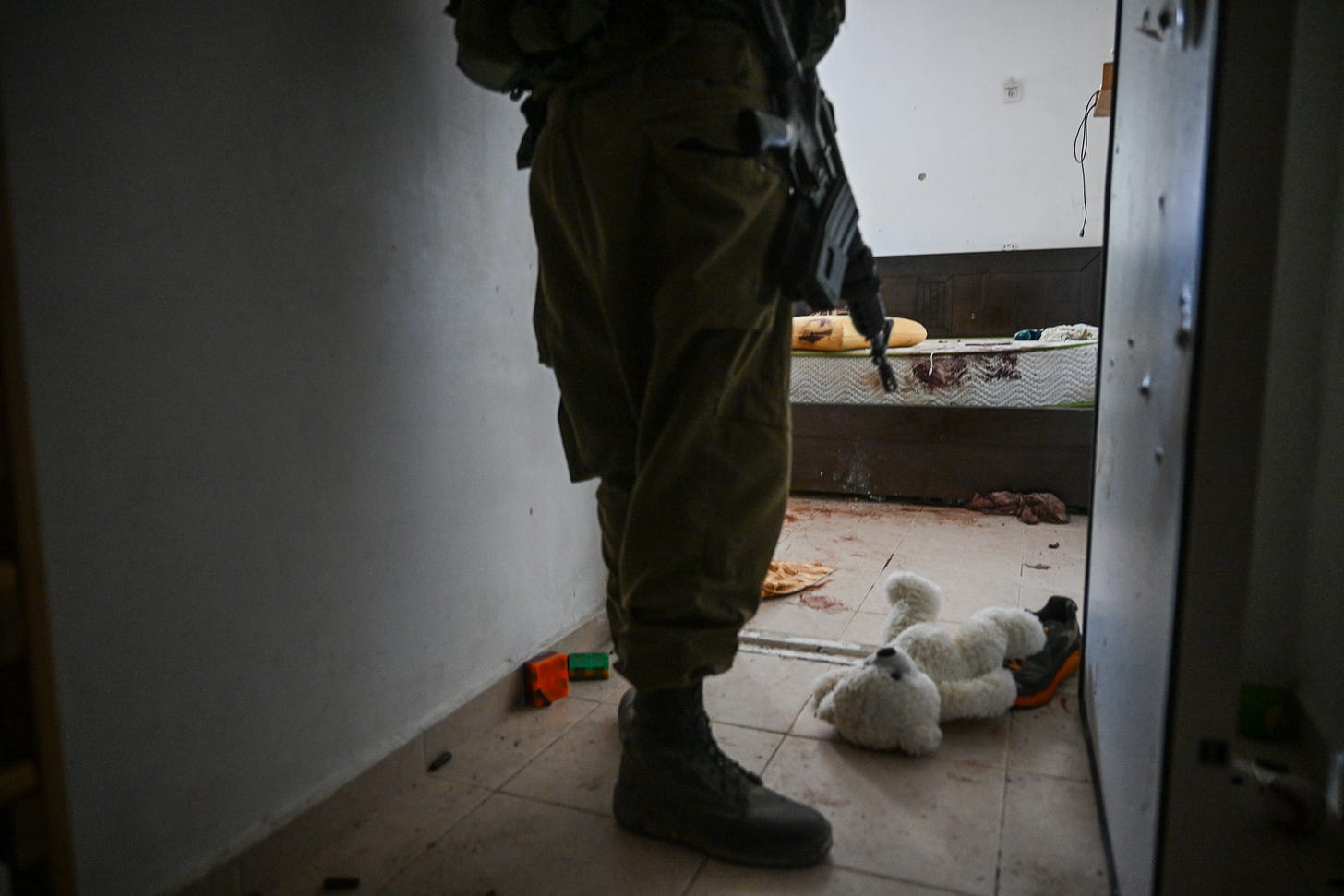
Hamas, Israel, and the Dark Power of Vengeance
I know what it feels like to be driven by vengeance in warfare. I also know it can lead soldiers to cross the line.

I WAS ONE MONTH into my first deployment when I saw my first dead little girl.
It was 2006 in Baghdad, and the Shia–Sunni civil war had erupted in full force. Carnage greeted us daily.
Hers wasn’t the first dead body I’d seen. Hardly. I had already responded to multiple mass-casualty car bombs that ripped through Baghdad’s markets. My boots were often covered with blood as I stepped over and through scores of dying Iraqis crying out for help.
But her murder was different.
Her body was crumpled in the back of an Iraqi Police Ford Ranger, alongside other victims of a powerful Iranian-backed terrorist group, Jaysh al-Mahdi.
We pushed the other bodies to the side of the truck and pulled her to the rear. She had been gagged and handcuffed, and her head punctured by a drill bit. We later found out that she had been raped in front of her family, to punish them for being Sunnis.
Her face still haunts me. At night, when I’m alone, and the demons come, I still see her face—with that puncture hole. Some nights, she comes to me in my nightmares, begging me to avenge her.
All I wanted was to avenge her innocence. But the culprits were my partners, the Iraqi Police. The Iraqi Police were thoroughly infested by Jaysh al-Mahdi fighters because they controlled the Ministry of Interior. I would never get my chance to avenge her death—and I’ve yet to fully forgive myself.
But I would eventually taste vengeance. During my years in Iraq and Afghanistan, I saw other atrocities up close and personal. The Taliban, the Haqqani Network, the Islamic State, and al Qaeda routinely murdered, raped, and tortured innocent civilians.
Killing those terrorists was intoxicating. Whether it was in a firefight or planning an operation and watching it unfold, slaying monsters is immensely satisfying. In fact, it is addictive, so I kept going back on six separate deployments.
THROUGHOUT THOSE DEPLOYMENTS, I learned that righteous vengeance is a potent drug.
That’s not something most people understand. When in polite society, I often speak of the horrors of war, of which there are many. This is the sort of thing that most Americans—especially well-meaning liberals—expect to hear, and want to hear.
Only once have I spoken openly and honestly about the thrill of killing. After a few too many drinks at an upscale party in Washington, D.C., an inquisitive woman asked me, “What’s the best thing about deploying?”
I stared at her deadpan and said, “Killing those animals for what they did.”
The roomful of pleasant professionals looked aghast.
THESE EXPERIENCES FLOODED MY MIND after seeing the horrific images of Hamas’s October 7 pogrom. Upon seeing the mutilated bodies of innocent children, I started thinking about all the children I had seen slaughtered by similar groups.
My fists immediately closed, and my shoulders furled forward. My jaws clenched tight, an acid taste flooding my mouth. These were the same physiological reactions I had when I saw atrocities in Iraq and Afghanistan.
As adrenaline coursed through my body and my rage peaked, I wanted only one thing—vengeance for the innocent massacred in Israel. It is the same feeling that hundreds of thousands of Israeli soldiers likely feel, many of them now in or preparing to enter Gaza.
In the coming weeks, the IDF will face perhaps the biggest military test since its creation 75 years ago. That is saying something for such a vaunted fighting force. They will face a determined enemy who has likely meticulously planned their defense. There will be snipers, attempts to kidnap soldiers via tunnels, human shields, suicide bombers, and likely advanced Iranian weapons (be on the lookout for explosively formed projectiles).
They will be fighting while the world watches intensely. Every exchange of fire will be filmed by ubiquitous cell phones, some broadcast in real time. Every Hamas fighter and supporter will try to paint IDF actions as inhumane so they can be used as propaganda, sapping the West’s resilience in the process.
The IDF will be held to a standard that Hamas is never judged by. It is not fair, and it will inevitably lead to the death of many IDF soldiers. It would be far easier to just fire and forget, civilian casualties be damned. Although my experiences in urban warfare weren’t existential, I often felt enraged when I could not respond in kind. Taking potshots from nearby mosques was very common in Baghdad. In Afghanistan, Taliban fighters would intentionally fire at us from crowded bazaars, then melt into the population, daring us to overreact. In Iraq, Iranian-backed terrorists often handed out toy guns to young boys. I nearly killed a young Iraqi boy during a dismounted patrol because of Iran’s disregard for life. Other American service members in a similar situation did pull that trigger—and were forever haunted.
WHILE IT IS NOT FAIR that the IDF is held to a different standard, it is also what makes them a fundamentally liberal fighting force. In a recent interview, Ali Baraka, a senior Hamas official, boasted, “The Israelis are known to love life. We, on the other hand, sacrifice ourselves.”
This echoes many other terrorists since 2001 who mocked the softness of Westerners for loving life while priding themselves for loving death. Hamas believes slaughtering babies, raping women, and kidnapping Holocaust survivors is their strength, but it will be their ruination.
Hamas’s brutality galvanized public opinion against them. They are now being painted as akin to the Islamic State by many Western leaders, including, most importantly, President Biden. This type of rhetoric provides vast room to maneuver for the IDF. However, the IDF’s righteous vengeance must be properly vectored. IDF sergeants and company-grade officers will have to walk a fine line by harnessing the power of their righteous vengeance in eliminating Hamas while also ensuring they don’t become the monsters they hope to destroy.
It happened to the United States in My Lai and Abu Ghraib. It happened to Staff Sgt. Robert Bales in a small district in Afghanistan. I know American service members who crossed that line after one of their friends was killed. They hungered for vengeance. And to a man, they regret it to this day.
Soldiers cross the line in battle. It happens in every war. When you allow men to kill, some inevitably go too far. That’s because there is a powerful temptation to respond to your enemy’s atrocities with similar brutality. Again: Bloodlust is a very real thing. I know that firsthand. I’ve felt it running through my veins. But it is also perilous. While the IDF must be ferocious and unleash overwhelming force to vanquish Hamas, they must also not lose themselves in the process. The balance is incredibly difficult to maintain, especially in an urban environment where the enemy lurks in every crevice—and after witnessing the most deadly attack against Jews since the Shoah.
The IDF will be fighting to restore deterrence. They will be fighting to destroy Hamas. They will also be fighting to avenge the 1,400 Jews who were butchered. That will motivate them to endure. It will steel their resolve. It mustn’t, however, change who they are.
Israelis love life. And in the final analysis, that is their strength, not their weakness.
















